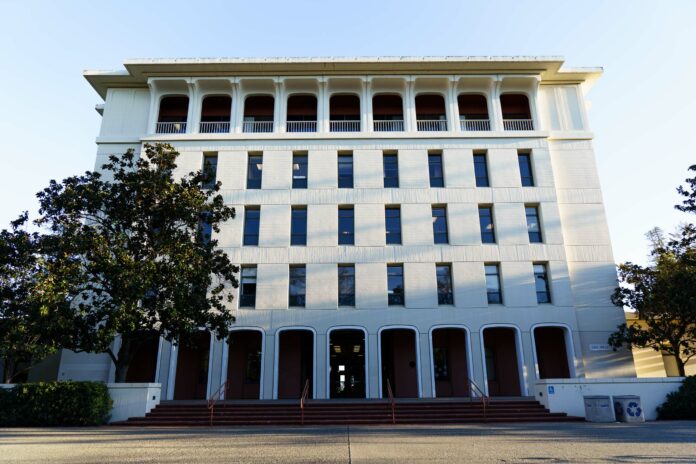Lack of diversity among students admitted by exception
Phase II of an internal admissions audit of the UC recently revealed that UC campuses have been poorly tracking the profiles of specially admitted students — students admitted due to a special talent rather than on the basis of academic achievement.
These students fall under the systemwide “admissions by exception” policy, which grants admission to students who may not necessarily meet all of the requisite academic qualifications but who demonstrate “potential for academic success” at the UCs. These can include people from homeschooled or rural backgrounds, students from extremely disadvantaged backgrounds and students with special talents in athletics, music or other activities.
Up to 6% of a UC incoming freshman class can be accepted according to these terms, with up to 4% coming from disadvantaged backgrounds. But according to undergraduate admissions system-wide, these individuals constituted less than 2% of acceptances during the last several years at the UCs.
The criteria for students specially admitted without a disadvantaged background — for example, veterans, adults or students with disabilities — was also found to be “contradictory.” The audit maintains that due to a lack of information, it could not analyze the special admissions process.
Still, the conclusions the audit drew may reflect a lack of diversity in special admissions enrollments, at least those that took place between 2017 and winter 2020.
For example, 21% of students admitted by exception were white, and 39% were white international students. By comparison, African American students made up 9% of students admitted by exception, and Asians and Latinos each made up 14%. Native Americans and Pacific Islanders both constituted less than 1% of these enrollments. The demographics of the remaining 2% of students admitted by exception are unknown.
Both audits were implemented in response to the national college admissions scandal in spring 2019. The scandal implicated parents and students at UCLA, UC Berkeley and other high-profile universities. The parents at UCLA, for example, bribed a soccer coach to recommend their daughter’s acceptance to the university, although it remains unclear whether she qualified for the Division I women’s soccer team there. As such, the UC pledged to monitor these acceptances more vigorously.
While Phase I of the audit previously implemented further controls over the admissions process in response to the scandal, Phase II was designed to assess the accuracy and efficiency of these regulations.
But due to the difficulty in tracking and assessing the demographic profiles of these types of students, the data in the audit remains incomplete.
“Most campuses either did not sufficiently document or did not retain their admissions decision approvals in accordance with the systemwide records retention schedule,” the audit said. It noted that “some locations found that admissions offices did not document approvals in a consistent manner,” adding that some campuses didn’t track the admissions in a centralized system.
And while several campuses have committees designed to assess such decisions — one UC has a group addressing accepted students whose academic qualifications do not meet minimum university requirements — the audit found that the universities lack sufficient documentation regarding the criteria and decision-making processes themselves.
Recommendations from the Phase I audit stipulated that freshman applicants evaluated on qualitative factors needed to have “two independent documented evaluations” justifying their admittance. Phase II recommends that committees dealing with these special admissions exceptions need to clearly establish leadership, objectives, membership qualifications, review criteria and decision-making practices, among other things.
When assessing the verification process — by which the UCs determine whether an applicant actually participates in all of the activities they list — the Phase II audit took a random sample of 25 verifications out of the 2,000 verifications included in the first audit. The Phase II audit identified issues with documentation and follow-up, causing problems with the applicant approval process.
For example, applicants may have a legitimate reason for not being able to obtain verification for an extracurricular activity and can thus receive a “permanent excusal,” but the audit discovered that reviewers failed to follow up on nearly half of these excusals. Other applicants were missing necessary forms.
The audit also explained that the individuals granting these permanent excusals may have done so without the knowledge of systemwide admissions.
Moreover, some documents authenticating participation in certain activities were either not submitted or incorrectly submitted. According to undergraduate admissions system-wide, the UC cancels approximately 100 applications each year due to a lack of verification responses, but cancels fewer than six applications annually for “admitted falsification.”
Phase II of the audit also recommends compliance with Assembly Bill 1383, requiring that “each student admitted to the University of California by exception be approved by a minimum of three senior campus administrators.”
The bill, enacted in Oct. 2019, also stipulates that student athletes admitted on the basis of athletic talent must participate in athletics for at least a year. By comparison, many of the students implicated in the college admissions scandal earlier last year did not participate in the athletic programs they were purportedly recruited for once arriving on campus.
Currently, the overall undergraduate admissions system is working on complying to the regulations in this bill during the 2020-2021 fiscal year.
Written by: Rebecca Bihn-Wallace — campus@theaggie.org




